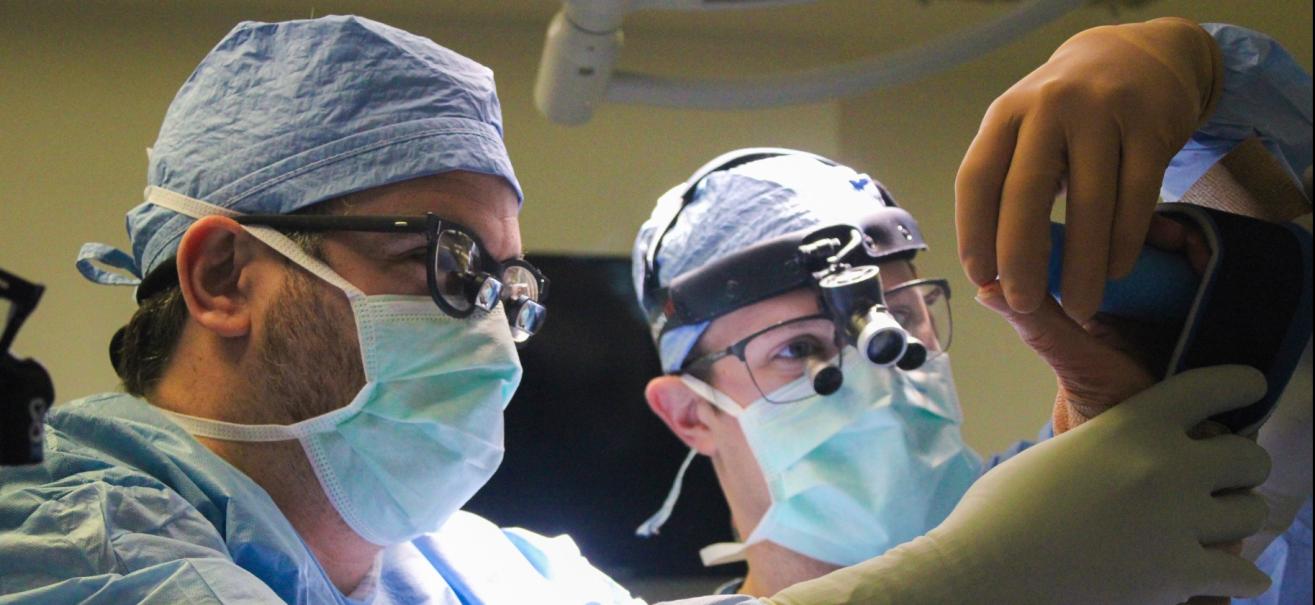The Otolaryngologist’s Role in Diagnosing Complex Head and Neck Conditions
Wiki Article
Exploring the Area of Otolaryngology: What to Expect When You Speak With an ENT
Otolaryngology, generally referred to as ENT, incorporates the medical diagnosis and treatment of nose, ear, and throat problems. For those experiencing related problems, seeking advice from an ENT professional can give clarity and relief. Understanding what to anticipate during such assessments is necessary for reliable interaction and treatment. This introduction will certainly describe essential aspects of the ENT experience, consisting of typical factors for sees and the processes associated with medical diagnosis and therapy.
Comprehending Otolaryngology: An Overview
Otolaryngology, usually described as ENT (Nose, throat, and ear) medicine, is a specialized branch of medicine that concentrates on the diagnosis and treatment of problems affecting these vital locations of the body. This field incorporates a wide variety of conditions, consisting of those associated to hearing, equilibrium, breathing function, and speech. Otolaryngologists are trained to take care of both surgical and clinical treatments, using advanced methods and modern technologies. Their knowledge expands past typical ailments, dealing with problems such as allergic reactions, sinus infections, and hearing loss. Furthermore, they play a crucial function in the monitoring of head and neck cancers, offering extensive treatment customized to individual person needs. Generally, otolaryngology continues to be vital for maintaining health and lifestyle in affected individuals.Common Factors to See an ENT Expert
Numerous individuals look for the knowledge of an ENT professional for a selection of factors, mirroring the varied nature of problems that influence the nose, throat, and ear. Usual concerns consist of chronic sinus problems, which frequently leads to persistent nasal blockage and facial discomfort. Allergic reactions and their associated symptoms, such as sneezing and itching, also motivate visits to these experts (ENT Clinic). Hearing loss, whether abrupt or gradual, is one more substantial factor for assessment. Furthermore, people may seek analysis for throat conditions, including persistent hoarseness or ingesting troubles. Sleep apnea, defined by interrupted breathing throughout rest, is often attended to by ENT experts. Each of these problems highlights the significance of specialized care in managing complicated ENT-related health concerns
Preparing for Your ENT Appointment
When planning for an ENT visit, it is important to gather pertinent details and think about any certain concerns. Patients should put together a comprehensive case history, consisting of previous ear, nose, or throat issues, surgical procedures, and present medicines. Documenting signs-- such as intensity, duration, and frequency-- can give useful understandings for the ENT professional. Furthermore, people ought to prepare a checklist of inquiries they desire to ask, ensuring that all issues are attended to throughout the go to. Bringing along any kind of pertinent clinical documents or examination outcomes can additionally aid the ENT in comprehending the individual's condition. Clients must confirm their visit information, including location, day, and time, to lessen any kind of final confusion. Proper preparation can enhance the efficiency of the assessment and result in much better end results.What to Anticipate Throughout the Appointment
As the consultation begins, the patient can expect to involve in a complete conversation with the ENT expert concerning their signs and case history. The professional will ask about the period, regularity, and seriousness of signs such as hearing loss, nasal congestion, or aching throat. In addition, the individual's previous medical problems, medications, and any kind of pertinent family members background will be evaluated, aiding the professional in forming a full understanding of the person's wellness. The ENT may also inquire about way of living aspects, such as exposure to toxic irritants or allergens. This open dialogue develops a foundation for the consultation, making certain that the individual's problems are attended to and setting the stage for any type of essential evaluations or recommendations for therapy.
Analysis Tests and Treatments in Otolaryngology
A variety of analysis examinations and procedures are essential in otolaryngology to accurately examine and detect problems influencing the throat, ear, and nose. Typical tests consist of audiometry, which measures hearing function, and tympanometry, examining middle ear pressure. Nasal endoscopy permits visualization of the nasal flows and sinuses, while laryngoscopy analyzes the throat and singing cables. Imaging strategies, such as CT scans and MRIs, give thorough sights of head and neck structures. Allergic reaction screening might likewise be conducted to recognize triggers for sinus or breathing issues. These analysis tools allow ENT specialists to establish a complete understanding of individuals' problems, guaranteeing tailored and efficient monitoring plans. Proper diagnosis is vital for effective treatment end results in otolaryngology.Treatment Choices Used by ENT Specialists
ENT specialists use a variety of treatment alternatives tailored to resolve certain problems impacting the ear, throat, and nose. These treatments vary from conservative strategies, such as medication and way of living modifications, to more invasive treatments. For circumstances, allergies might be taken care of with antihistamines or immunotherapy, while chronic sinusitis may call for nasal corticosteroids or sinus surgical treatment. For hearing loss, ENT professionals often suggest listening device or medical treatments like cochlear implants. In situations of throat disorders, choices can include speech therapy or surgeries to remove obstructions. Furthermore, they might give guidance for taking care of rest apnea, including using CPAP gadgets or surgical interventions. In general, the objective is to enhance people' lifestyle via personalized care and reliable therapy strategies.When to Seek Follow-Up Treatment With an ENT
When to look for follow-up treatment with an ENT expert is crucial for handling continuous signs and symptoms or difficulties related to nose, throat, and ear conditions, acknowledging. Individuals need to take into consideration scheduling a follow-up visit if symptoms linger despite initial therapy, such as persistent ear pain, nasal congestion, or throat discomfort. Changes in hearing, equilibrium problems, or uncommon nasal discharge might likewise warrant additional evaluation. Additionally, if a person experiences negative effects from prescribed drugs or has actually undergone a surgical treatment, follow-up care is necessary to monitor recovery and resolve any kind of concerns. Prompt consultations can ensure reliable monitoring of problems, stop prospective issues, and offer assurance regarding one's health and wellness. Seeking follow-up treatment advertises proactive health and wellness monitoring in otolaryngology.Often Asked Inquiries

What Qualifications Should I Try to find in an ENT Professional?
When seeking an ENT expert, one must look for board accreditation, relevant experience, and strong person evaluations. Additionally, reliable communication abilities and a compassionate method can significantly improve the overall treatment experience.Just how Do I Select the Right ENT for My Needs?
Choosing the best ENT specialist entails assessing their qualifications, experience, and person reviews (Hearing). It is crucial to contemplate their interaction design and approach to therapy, ensuring they straighten with the individual's particular wellness requirements and choicesAre There Any Kind Of Dangers Linked With ENT Procedures?
The risks connected with ENT check here treatments may include infection, blood loss, anesthesia complications, and possible damage to surrounding frameworks. Patients ought to go over these threats with their doctor to recognize individual concerns and warranty educated decisions.Exactly How Can I Manage Stress And Anxiety Before My ENT Appointment?
To take care of anxiousness before an appointment, individuals can exercise deep breathing workouts, visualize positive outcomes, prepare questions ahead of time, and look for assistance from good friends or family, fostering a sense of confidence and peace.What Should I Do if I Experience Side Impacts From Therapy?
The person needs to immediately report them to their healthcare company if side effects from treatment take place. Adjustments to treatment or additional treatments may be necessary to guarantee security and performance in handling their condition - ENT. As the assessment starts, the individual can expect to involve in a detailed conversation with the ENT expert about their signs and symptoms and medical history. These diagnostic devices allow ENT professionals to establish a comprehensive understanding of patients' conditions, guaranteeing customized and reliable administration strategies. ENT specialists offer a selection of therapy options tailored to address certain problems affecting the throat, nose, and ear. When seeking an ENT specialist, one ought to look for board certification, relevant experience, and solid patient reviews. Selecting the right ENT professional involves examining their credentials, experience, and patient evaluationsReport this wiki page